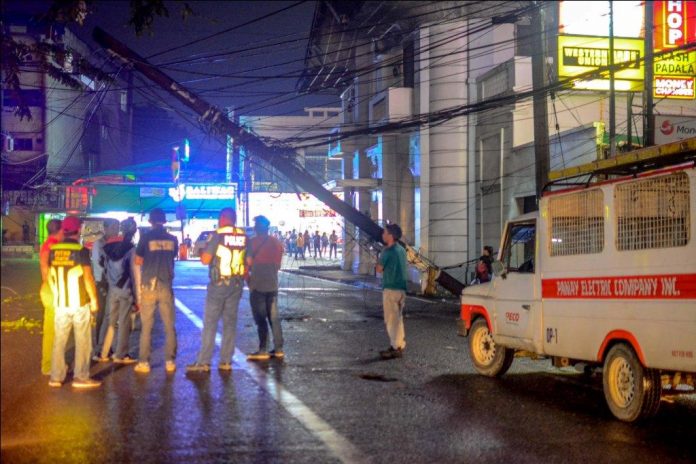
ILOILO City – More than half or 1,464 cases out of 2,887 incidents of fire in this city since January 2014 were pole fires, the Bureau of Fire Protection (BFP) reported to the Energy Regulatory Commission (ERC).
Incidents of pole fire keep on rising because the power distribution utility that owns the poles, franchise-less Panay Electric Co. (PECO), has no trained technical people to solve the problem, the bureau added.
According to
Chief Inspector Christopher Regencia, city fire marshal, PECO informed the BFP
it did not have the technical people to attend to the pole fires except to
monitor and document those cases.
A big dent in the resources of the fire department was how Regencia described
PECO’s failure to deal with fire incidents involving its electricity poles.
What’s happening here, added Regencia, is so unlike in other cities such as Cagayan de Oro where he was last assigned before being moved to Iloilo City. There, he said, the power distribution utility had its own fire prevention and containment unit to deal with pole fires.
Regencia submitted his office’s report to the ERC in support of the complaint filed by Mayor Jerry Treñas on the threat to public safety posed by PECO’s “inadequately-maintained lines, power outages and hazardous electric posts.”
PECO had claimed only a final technical assessment could determine if it is to blame for the pole fires. It averred that wires of telecommunications and cable television companies are also connected to their electricity poles.
However, Regencia said the telecommunications companies’ wires usually carry a 24-volt charge as opposed to PECO wires which has a 220-voltage charge.
“Only electricity wires, either damaged or overloaded, can cause fires, not telephone or cable television wires,” Regencia told ERC.
BFP data submitted by Regencia to the ERC showed that from Jan. 1, 2014 to Oct. 29, 2019 a total of 2,887 fire incidents occurred in Iloilo City, with pole fires numbering 1,464 cases, or 51.187 percent of all fire incidents during the almost six-year period.
Out of the 427
city fire incidents in 2014, 224 were pole fires while there were 228 cases of
pole fires in 2015; 303 cases in 2016; 275 incidents in 2017;and another 233
pole fires in 2018.
A total of 201 pole fires erupted in the city from January to Oct. 27, 2019.
The fire department listed the official reason for these incidents as “Short Circuit Secondary Service Lines,” which basically meant exposed electricity wires bursting into flames after short circuiting and burning the wooden poles where they were connected.
Another factor behind the pole fires, according to BFP, is PECO’s failure to solve the problem on illegal connections or “jumpers” where connections are usually through wires connected to spliced PECO wires, with the open wire causing the fire in the pole when strong winds cut them from the “jumpers”.
Meanwhile, Mayor Treñas said he filed a complaint at the ERC and Malacañang because PECO ignored informal and formal appeals from his office to address the problem by fixing or replacing old distribution wires and electricity poles with new ones.
Treñas said he was particularly alarmed after the Iloilo City Fire Marshal and BFP reported that in three days alone from Oct. 19 to 21, nine PECO electricity poles around the city caught fire either due to exploding transformers or severed electricity lines, setting fire on the wooden poles.
According to Treñas, he also got enraged by the statement of Marcelo Cacho, administrative manager of PECO who shrugged off incidents of post fires throughout the city.
The safety and security of the people of Iloilo City and the damage to government property are not small matters, he stressed.
PECO’s franchise expired on Jan. 19 this year and it failed to secure one from Congress over mounting consumer complaints such as poor service quality and safety, unfriendly customer relations and frequent power outages, among others.
A 25-year-franchise was instead granted to More Electric and Power Corp.
PECO is currently
operating under a provisional Certificate of `Public Convenience and Necessity
(CPCN) from ERC but it has to go when More Electric and Power Corp. completes
its full takeover of the city’s power distribution system.
Under ERC Resolution No. 5, Series of 2008, any distribution utility granted a
CPCN to operate a distribution system in any area must comply with standards
set under the Philippine Grid Code and the Philippine Distribution Code,
especially those that concern public safety./PN



